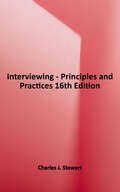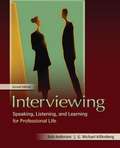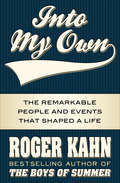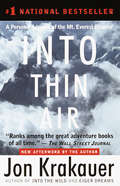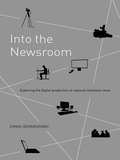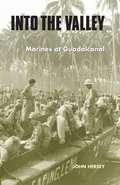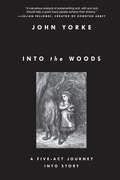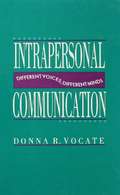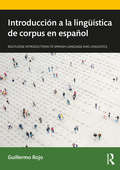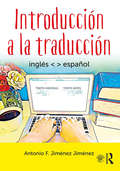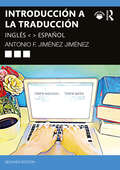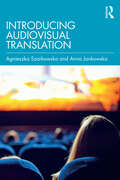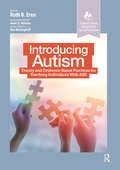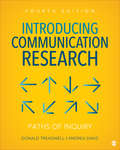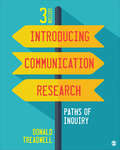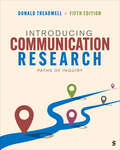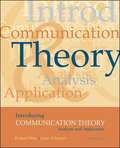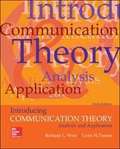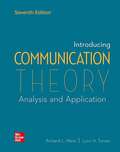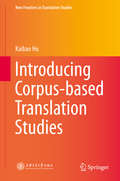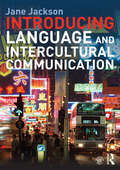- Table View
- List View
Interviewing: Principles and Practices, 16th Edition
by Charles J. StewartThis is the most widely used text for the interviewing course, continues to reflect the growing sophistication with which interviewing is being approached, incorporating the ever-expanding body of research in all types of interview settings, recent communication theory, and the importance of equal opportunity laws on interviewing practices. It provides the most thorough treatment of the basics of interviewing, including the complex interpersonal communication process, types and uses of questions, and the structuring of interviews from opening to closing.
Interviewing: Speaking, Listening, and Learning for Professional Life
by Rob Anderson George M. KillenbergInterviewing is a collaborative dialogue ... That's the unique framework of Interviewing: Speaking, Listening, and Learning for Professional Life. Unlike most interviewing texts, this book emphasizes that we must understand the role of both interviewer and interviewee in order to be fully competent in the interviewing process.
Interviewing: Speaking, Listening, and Learning for Professional Life (Second Edition)
by Rob Anderson G. Michael KillenbergThe interviewing process, offers a practical guide to the fascinating art of asking and answering questions. They urge students not to view interviewing as a procedure or as a collection of techniques; instead, they present the process of interviewing as a fascinating opportunity for learning through dialogue.
Intimacy and Friendship on Facebook
by Alex LambertIntimacy and Friendship on Facebook theorises the impact of Facebook on our social lives through the lens of intimacy. Lambert constructs an original understanding of why people welcome public intimacy on Facebook and how they attempt to control it, asking the reader to re-imagine what it means to be intimate online.
Into My Own: The Remarkable People and Events that Shaped a Life
by Roger KahnFrom the author of A Season in the Sun, a memoir from one of America&’s foremost sportswriters about his life and influences. After successful seasons as a newspaperman and magazine writer, Roger Kahn burst onto the national scene in 1972 with his memorable bestseller, The Boys of Summer, memorializing the Brooklyn Dodgers. Here he wrote a book for the hearts and minds of his readers. Chronicling his own life, Into My Own is Kahn&’s reflection on the eight people who shaped him as a man, a father, and a writer.Into My Own is the touching memoir of an unassuming man, whose great love of baseball and literature led him into extraordinary experiences, opportunities, and friendships. Even amidst great family tragedy and personal difficulty, Kahn prevailed—amongst poets, writers, politicians, and most of all, ballplayers.&“In this engaging memoir, Kahn…looks back at baseball and much more as he presents his episodic reminiscences as free-form essays arranged loosely around iconic figures from his past…Kahn has a graceful, personal style, full of deftly evoked color and characters, with a bit of the newspaperman's hard-bitten swagger and a two-fisted liberalism one doesn't see much anymore.&”—Publishers Weekly Praise for Roger Kahn &“As a kid, I loved sports first and writing second, and loved everything Roger Kahn wrote. As an adult, I love writing first and sports second, and love Roger Kahn even more.&”—Pulitzer Prize winner, David Maraniss &“A work of high moral purpose and great poetic accomplishment. The finest American book on sports.&”—James Michener on The Boys of Summer &“Kahn has the almost unfair gift of easy, graceful writing.&”—Boston Herald
Into Thin Air: A Personal Account Of The Mount Everest Disaster
by Jon Krakauer#1 NATIONAL BESTSELLER • The epic account of the storm on the summit of Mt. Everest that claimed five lives and left countless more—including Krakauer's—in guilt-ridden disarray. "A harrowing tale of the perils of high-altitude climbing, a story of bad luck and worse judgment and of heartbreaking heroism." —PEOPLE A bank of clouds was assembling on the not-so-distant horizon, but journalist-mountaineer Jon Krakauer, standing on the summit of Mt. Everest, saw nothing that "suggested that a murderous storm was bearing down." He was wrong. By writing Into Thin Air, Krakauer may have hoped to exorcise some of his own demons and lay to rest some of the painful questions that still surround the event. He takes great pains to provide a balanced picture of the people and events he witnessed and gives due credit to the tireless and dedicated Sherpas. He also avoids blasting easy targets such as Sandy Pittman, the wealthy socialite who brought an espresso maker along on the expedition. Krakauer's highly personal inquiry into the catastrophe provides a great deal of insight into what went wrong. But for Krakauer himself, further interviews and investigations only lead him to the conclusion that his perceived failures were directly responsible for a fellow climber's death. Clearly, Krakauer remains haunted by the disaster, and although he relates a number of incidents in which he acted selflessly and even heroically, he seems unable to view those instances objectively. In the end, despite his evenhanded and even generous assessment of others' actions, he reserves a full measure of vitriol for himself. This updated trade paperback edition of Into Thin Air includes an extensive new postscript that sheds fascinating light on the acrimonious debate that flared between Krakauer and Everest guide Anatoli Boukreev in the wake of the tragedy. "I have no doubt that Boukreev's intentions were good on summit day," writes Krakauer in the postscript, dated August 1999. "What disturbs me, though, was Boukreev's refusal to acknowledge the possibility that he made even a single poor decision. Never did he indicate that perhaps it wasn't the best choice to climb without gas or go down ahead of his clients." As usual, Krakauer supports his points with dogged research and a good dose of humility. But rather than continue the heated discourse that has raged since Into Thin Air's denouncement of guide Boukreev, Krakauer's tone is conciliatory; he points most of his criticism at G. Weston De Walt, who coauthored The Climb, Boukreev's version of events. And in a touching conclusion, Krakauer recounts his last conversation with the late Boukreev, in which the two weathered climbers agreed to disagree about certain points. Krakauer had great hopes to patch things up with Boukreev, but the Russian later died in an avalanche on another Himalayan peak, Annapurna I. In 1999, Krakauer received an Academy Award in Literature from the American Academy of Arts and Letters--a prestigious prize intended "to honor writers of exceptional accomplishment." According to the Academy's citation, "Krakauer combines the tenacity and courage of the finest tradition of investigative journalism with the stylish subtlety and profound insight of the born writer. His account of an ascent of Mount Everest has led to a general reevaluation of climbing and of the commercialization of what was once a romantic, solitary sport; while his account of the life and death of Christopher McCandless, who died of starvation after challenging the Alaskan wilderness, delves even more deeply and disturbingly into the fascination of nature and the devastating effects of its lure on a young and curious mind."
Into the Newsroom: Exploring the Digital Production of Regional Television News
by Emma HemmingwayInto the Newsroom provides a rigorous investigation into the everyday rituals that are performed in the television newsroom, and offers a unique suggestion that news is both a highly haphazard and yet technologically complicated process of deliberate construction involving the interweaving of reflexive professional journalists as well as developing, unpredictable technologies. Arguing specifically for a recognition and an exploration of technological agency, this book takes the reader on an exciting journey into the digital newsroom, using exclusive observation and interviews from those journalists working on the BBC's recent pilot project of local television news as part of its empirical evidence. This is an essential introduction for both those seeking to understand news processes at the level of every day routines and practices, and for those students and scholars who are eager to adopt new and challenging ways to theorise news as practice.
Into the Valley: Marines at Guadalcanal
by John HerseyHersey gives insightful details concerning the jungle environment, recounts conversations among the men before, during, and after the battle at Guadalcanal, and describes how the wounded were evacuated as well as other works of daily heroism.
Into the Woods: A Five-Act Journey Into Story
by John YorkeAn analysis of the fundamental narrative structure, why it works, the meanings of stories, and why we tell them in the first place.The idea of Into the Woods is not to supplant works by Aristotle, Lajos Egri, Robert McKee, David Mamet, or any other writers of guides for screenwriters and playwrights, but to pick up on their cues and take the reader on a historical, philosophical, scientific, and psychological journey to the heart of all storytelling. In this exciting and wholly original book, John Yorke not only shows that there is truly a unifying shape to narrative—one that echoes the great fairytale journey into the woods, and one, like any great art, that comes from deep within—he explains why, too. With examples ranging from The Godfather to True Detective, Mad Men to Macbeth, and fairy tales to Forbrydelsen (The Killing), Yorke utilizes Shakespearean five-act structure as a key to analyzing all storytelling in all narrative forms, from film and television to theatre and novel-writing—a big step from the usual three-act approach. Into the Woods: A Five-Act Journey into Story is destined to sit alongside David Mamet’s Three Uses of the Knife, Robert McKee’s Story, Syd Field’s Screenplay, and Lajos Egri’s The Art of Dramatic Writing as one of the most original, useful, and inspiring books ever on dramatic writing.Praise for Into the Woods“Love storytelling? You need this inspiring book. John Yorke dissects the structure of stories with a joyous enthusiasm allied to precise, encyclopedic knowledge. Guaranteed to send you back to your writing desk with newfound excitement and drive.” —Chris Chibnall, creator/writer, Broadchurch and Gracepoint“Outrageously good and by far and away the best book of its kind I’ve ever read. I recognized so much truth in it. But more than that, I learned a great deal. Time and again, Yorke articulates things I’ve always felt but have never been able to describe. . . . This is a love story to story—erudite, witty and full of practical magic. I struggle to think of the writer who wouldn’t benefit from reading it—even if they don’t notice because they’re too busy enjoying every page.” —Neil Cross, creator/writer, Luther and Crossbones“Part ‘how-to’ manual, part ‘why-to’ celebration, Into the Woods is a wide-reaching and infectiously passionate exploration of storytelling in all its guises . . . exciting and thought-provoking.” —Emma Frost, screenwriter, The White Queen and Shameless
Intrapersonal Communication: Different Voices, Different Minds (Routledge Communication Series)
by Donna R. VocateIntrapersonal communication is a relatively new phenomenon for communication study and still lacks the grounding of a sound theoretical base. The first to present a developed theory of this discipline, this book's goal is to provide graduate students and professionals with an organized point of departure for their research. The theoretical section begins with an intrapersonal communication theory derived from the sociogenetic views of George Herbert Mead and L.S. Vygotsky. This theory emphasizes social interaction, the developmental nature of mind, and the crucial role of speech in creating a self, a culture, and a mind which then interact in human intrapersonal communication. This section also provides the reader with a coherent interdisciplinary knowledge base taken from speech communication, biology, neurology, cultural psychology, anthropology, sociology, speech pathology, and linguistics. The integrated theoretical perspective that results makes the study compatible with communication scholarship focusing on the social, cultural, cognitive, or performance aspects of communication phenomena. The applications section examines neurophysiological/intrapersonal communication research methods and studies to date, together with specific applications of intrapersonal communication theory to childhood language acquisition, to the establishment of gender identities, and to intrapersonal competence. The final chapter presents pedagogical guidance on how we can influence intrapersonal competence and performance as well as commenting on the current state of this study and its future prospects. The editor's interstitial commentary facilitates access by readers wishing to constuct their own theory.
Introducción a la lingüística de corpus en español
by Guillermo RojoIntroducción a la lingüística de corpus en español es la primera obra concebida desde la óptica del español para investigar los corpus textuales existentes en la actualidad. Destinada a conjugar armónicamente la exposición de cuestiones teóricas y metodológicas, proporciona información detallada sobre las tareas necesarias en el diseño, construcción y explotación de un corpus a partir de numerosos ejemplos de obtención de datos sobre diferentes cuestiones léxicas y gramaticales. Características principales: • Exposición de cuestiones teóricas y metodológicas combinada con el tratamiento de casos prácticos de extracción y análisis de datos procedentes de corpus textuales de español; • Análisis de fenómenos léxicos y gramaticales del español desde diferentes perspectivas y con atención a la variabilidad diacrónica, diatópica y diastrática; • Indicación detallada del modo de obtener los datos necesarios para la investigación en diferentes corpus del español; • Inclusión de un resumen inicial, actividades de investigación en cada capítulo y lecturas complementarias recomendadas; • Presentación de un capítulo final con herramientas informáticas útiles para el análisis de textos no incluidos en corpus textuales; • Recopilación de los principales términos usados en la lingüística de corpus en un glosario bilingüe (español e inglés). Introducción a la lingüística de corpus en español es una obra con un enfoque marcadamente didáctico, y dirigida fundamentalmente a estudiantes avanzados de grado y posgrado, profesores que necesiten hacer uso de corpus en sus clases, investigadores que precisen un conocimiento más profundo de la lingüística de corpus o expertos en otras disciplinas que deseen familiarizarse con una perspectiva técnica de los fenómenos lingüísticos.
Introducción a la traducción: inglés - español
by Antonio F Jiménez JiménezEste manual introduce al lector a la actividad de la traducción de inglés a español y viceversa, adoptando un punto de vista práctico y siguiendo los estándares profesionales actuales.? Introducción a la traducción examina una gran variedad de temas enfocados en resolver los problemas de traducción que se suelen encontrar en los textos, por ejemplo, en relación a los elementos culturales, los aspectos connotativos, la variación lingüística, la traducción subordinada y la traducción especializada. Para ello, se exploran detenidamente, y con multitud de ejemplos prácticos, las técnicas, estrategias y herramientas disponibles durante la actividad traductora. La página web que acompaña a este manual incluye además información lingüística contrastiva entre el inglés y el español para evitar problemas de transferencia negativa entre ambos idiomas.? Introducción a la traducción aumentará la competencia traductora de los lectores de una manera sistemática, coherente y contextualizada, ofreciendo oportunidades de práctica a través de un gran número de actividades y textos para traducir.? ? This manual introduces readers to the activity of Spanish-English/English-Spanish translation while adopting a practical perspective aligned with current professional standards.? Introducción a la traducción examines a wide variety of topics that focus on resolving common problems that tend to arise throughout the process of translating different kinds of texts. For example, this book explores translation issues with respect to cultural elements, connotative meaning, linguistic variations, constrained translation and specialized translation. It offers a multitude of practical examples and a thorough consideration of the techniques, strategies and tools available to translators. Among other resources, the companion website includes contrastive linguistic analysis of English and Spanish to help avoid negative transfer issues between both languages.? Introducción a la traducción will improve the reader’s competence as a translator in a systematic, coherent and contextualized way, providing abundant opportunities to practice translation skills through ample hands-on activities and a wide variety of texts to translate.
Introducción a la traducción: inglés < > español
by Antonio F. Jiménez JiménezAhora en su segunda edición, este manual introduce al lector a la actividad de la traducción de español-inglés/inglés-español, adoptando un punto de vista práctico y siguiendo los estándares profesionales actuales. Integrando los últimos avances en la profesión de la traducción con sólidos enfoques pedagógicos, Introducción a la traducción explora las competencias necesarias durante el proceso de traducción; desde el conocimiento de las lenguas y las culturas hasta la comprensión de la traducción como actividad y como producto, a través de una diversidad de tipos textuales. Cada lección cuenta con una gran cantidad de actividades y ejercicios prácticos. Esta nueva edición ofrece más actividades, más ejemplos que reflejan las variedades de español de Latinoamérica, contenidos ampliados y nuevos temas de actual relevancia, como la interpretación a distancia, la localización, la traducción automática y la inteligencia artificial. Los estudiantes aumentarán su competencia traductora de una manera sistemática, relevante y contextualizada. En esta segunda edición, se han aumentado los recursos disponibles en la página web del manual, incluyendo nuevas presentaciones de PowerPoint y herramientas de evaluación para los instructores, así como más textos para la práctica de la traducción para los estudiantes. Now in its second edition, this manual introduces readers to the activity of Spanish-English/English-Spanish translation, while adopting a practical perspective aligned with current professional standards. Integrating the latest developments in the translation profession with solid pedagogical approaches, Introducción a la traducción explores the competencies needed during the translation process; from knowledge about the languages and cultures, to understanding translation as an activity and as a product through a diversity of text types. Each lesson provides ample practice through hands-on activities and exercises. This new edition offers more activities, more examples relevant to Latin American varieties of Spanish, expanded content, and coverage of contemporary topics, such as remote interpreting, localization, machine translation, and artificial intelligence. Students will increase their translation competency in a systematic, meaningful, and contextualized way. In this second edition, the companion website provides additional resources, including new PowerPoint presentations and assessment tools for instructors, and more texts for translation practice for students.
Introducing Audiovisual Translation
by Agnieszka Szarkowska Anna JankowskaThis user-friendly textbook offers comprehensive insights into all facets of audiovisual translation and media localisation.Serving as a comprehensive guide spanning seven chapters, it begins by introducing audiovisual translation (AVT). It goes on to explore the historical backdrop and highlights the distinctions from traditional written text translation. The authors expertly navigate you through the primary AVT modalities: interlingual subtitling, dubbing, voice-over, subtitling for the deaf and hard of hearing, live subtitling, and audio description.A blend of theoretical concepts and practical, real-world examples in various languages ensures a seamless understanding of the fundamental principles of AVT. The book clearly guides you through the most important aspects of each type of AVT.Designed for those exploring various AVT forms, budding audiovisual translators, and those interested in contemporary AVT trends and research, this book is an invaluable resource for students of translation and linguistics and for educators in AVT across higher education and media localisation programmes.
Introducing Autism: Theory and Evidence-Based Practices for Teaching Individuals with ASD (Evidence-Based Instruction in Special Education)
by Ruth ErenWritten by educators for educators, Introducing Autism: Theory and Evidence-Based Practices for Teaching Individuals With ASD is an introductory text offering a broad picture of Autism Spectrum Disorder for students, teachers, related service providers, and other school personnel who are engaged in the education of individuals with ASD.Introducing Autism imparts knowledge and understanding of the broad spectrum of ASD and suggests evidence-based practices to support this population. Editor Dr. Ruth Eren and the text contributors provide readers with a firm foundation of facts, strategies, and processes that help explain and address the complex profile of an individual with ASD. As a result of this understanding, current and future practitioners will be equipped with the skills and strategies to work collaboratively and effectively with their school team as they create a program for a student on the spectrum.What’s included in Introducing Autism: Content supported by case studies based in authentic educational settings Evidence-based practices suggested for use in the classroom Voices from the Spectrum sections in each chapter which feature the viewpoints from individuals on the spectrum Introducing Autism: Theory and Evidence-Based Practices for Teaching Individuals With ASD will enable universities to offer a comprehensive course that provides a strong foundation of knowledge and understanding of ASD to prepare teachers and related service providers for certification.
Introducing Communication Research: Paths of Inquiry
by Donald F. Treadwell Andrea DavisIntroducing Communication Research: Paths of Inquiry, Fourth Edition demystifies the theories and applications of communication research through its focus on methods in practice. Offering an overview of the research process with a focus on examples of research in real-world settings, Donald Treadwell and Andrea Davis introduce both quantitative and qualitative methods.
Introducing Communication Research: Paths of Inquiry
by Donald F. Treadwell Andrea DavisIntroducing Communication Research: Paths of Inquiry, Fourth Edition demystifies the theories and applications of communication research through its focus on methods in practice. Offering an overview of the research process with a focus on examples of research in real-world settings, Donald Treadwell and Andrea Davis introduce both quantitative and qualitative methods.
Introducing Communication Research: Paths of Inquiry
by Donald F. TreadwellIntroducing Communication Research: Paths of Inquiry helps students understand the communication research process from start to finish. The Third Edition has been updated throughout to explain the Internet and social media as tools and topics for communication research. Streamlined, accessible, and with campus-based research examples that students can relate to, this text guides students through the fundamentals of conducting research and presenting research findings for scholarly, professional, news/media, and web audiences.
Introducing Communication Research: Paths of Inquiry
by Donald TreadwellIntroducing Communication Research: Paths of Inquiry teaches students the basics of communication research in an accessible manner by using student-focused real-world examples, engaging application exercises, and up-to-date resources. Donald Treadwell guides readers through the process of conducting communication research and presenting findings for a diversity of audiences, and the book emphasizes the Internet and social media as both topics of, and tools for, communication research. The Fifth Edition adds new pedagogical features, a new social media and big data section in each method chapter, coverage throughout of the impact of artificial intelligence (AI) and particularly in relation to reporting and presenting research; and references the latest research and data sources related to changes in communication brought about by the COVID-19 pandemic. Included with this title: LMS Cartridge: Import this title’s instructor resources into your school’s learning management system (LMS) and save time. Don′t use an LMS? You can still access all of the same online resources for this title via the password-protected Instructor Resource Site. Learn more.
Introducing Communication Research: Paths of Inquiry
by Donald TreadwellIntroducing Communication Research: Paths of Inquiry teaches students the basics of communication research in an accessible manner by using student-focused real-world examples, engaging application exercises, and up-to-date resources. Donald Treadwell guides readers through the process of conducting communication research and presenting findings for a diversity of audiences, and the book emphasizes the Internet and social media as both topics of, and tools for, communication research. The Fifth Edition adds new pedagogical features, a new social media and big data section in each method chapter, coverage throughout of the impact of artificial intelligence (AI) and particularly in relation to reporting and presenting research; and references the latest research and data sources related to changes in communication brought about by the COVID-19 pandemic. Included with this title: LMS Cartridge: Import this title’s instructor resources into your school’s learning management system (LMS) and save time. Don′t use an LMS? You can still access all of the same online resources for this title via the password-protected Instructor Resource Site. Learn more.
Introducing Communication Theory: Analysis And Application
by Richard West Lynn H. TurnerThis popular text introduces the field of communication to students who may have little or no background in communication theory. Its three overriding goals are to help students understand the pervasiveness of theory in their lives, to demystify the theoretical process, and to help students become more systematic and critical on their thinking about theory. Each theory chapter follows a consistent format that includes a vignette, an introduction, a summary of assumptions, a description of core concepts, and a critique. This consistency provides continuity for students and ensures a balanced presentation of theories. The Third edition includes the most current communication research available (at the time), with over 100 new references.
Introducing Communication Theory: Analysis And Application
by Lynn Turner Richard WestThis text introduces the field of communication to students who may have little or no background in communication theory. The three overriding goals of the book are to help students understand the pervasiveness of theory in their lives, to demystify the theoretical process, and to help students become more systematic and critical in their thinking about theory. Chapter by chapter approach allows students to understand one theory at a time, staying focused on one theory before learning another theory.
Introducing Communication Theory: Analysis and Application
by Richard WestIntroducing Communication Theory: Analysis and Application focuses on the links between theory and everyday experiences. This text uses an engaging writing style and a consistent, organized template to present the concept of theory and help students become insightful, critical thinkers. The Connect course for this offering includes SmartBook, an adaptive reading and study experience that guides students to master, recall, and apply key concepts while providing automatically graded assessments.
Introducing Corpus-based Translation Studies
by Kaibao HuThe book addresses different areas of corpus-based translation studies, including corpus-based study of translation features, translator's style, norms of translation, translation practice, translator training and interpreting. It begins by tracing the development of corpus-based translation studies and introducing the compilation of different types of corpora for translation research. The use of corpora in different research areas is then discussed in detail, and the implications and limitations of corpus-based translation studies are addressed. Featuring the use of figures, tables, illustrations and case studies, as well as discussion of methodological issues, the book offers a practical guide to corpus-based translation. It will be of interest to postgraduate students and professionals who are interested in translation studies, interpreting studies or computer-aided translation.
Introducing Language and Intercultural Communication
by Jane JacksonIntroducing Language and Intercultural Communication is a lively and accessible introduction for undergraduates who are new to the area of intercultural communication. Incorporating real-life examples from around the world and drawing on current research, this text argues against cultural stereotyping and instead provides students with a skill-building framework to enhance understanding of the complexities of language and intercultural communication in diverse international settings. Readers will learn to understand and become aware of power relations, positioning and the impact of social and political forces on language choice and the intercultural communication process. This is the essential text for undergraduate students studying courses in intercultural communication for the first time. Features include: clear learning objectives to structure your study end of chapter discussion questions to test your knowledge highlighted glossary terms to provide a strong understanding of the relevant vocabulary an array of photos including signs which make use of non-verbal codes and many examples that illustrate such issues as intercultural misunderstandings and the effects of culture shock substantial online resources for students including learning objectives, suggested readings, links to media resources and real-world intercultural scenarios and activities. Additional in-depth instructor resources feature test materials, powerpoints, key terms, extended chapter outlines and sample assignments and syllabi.
